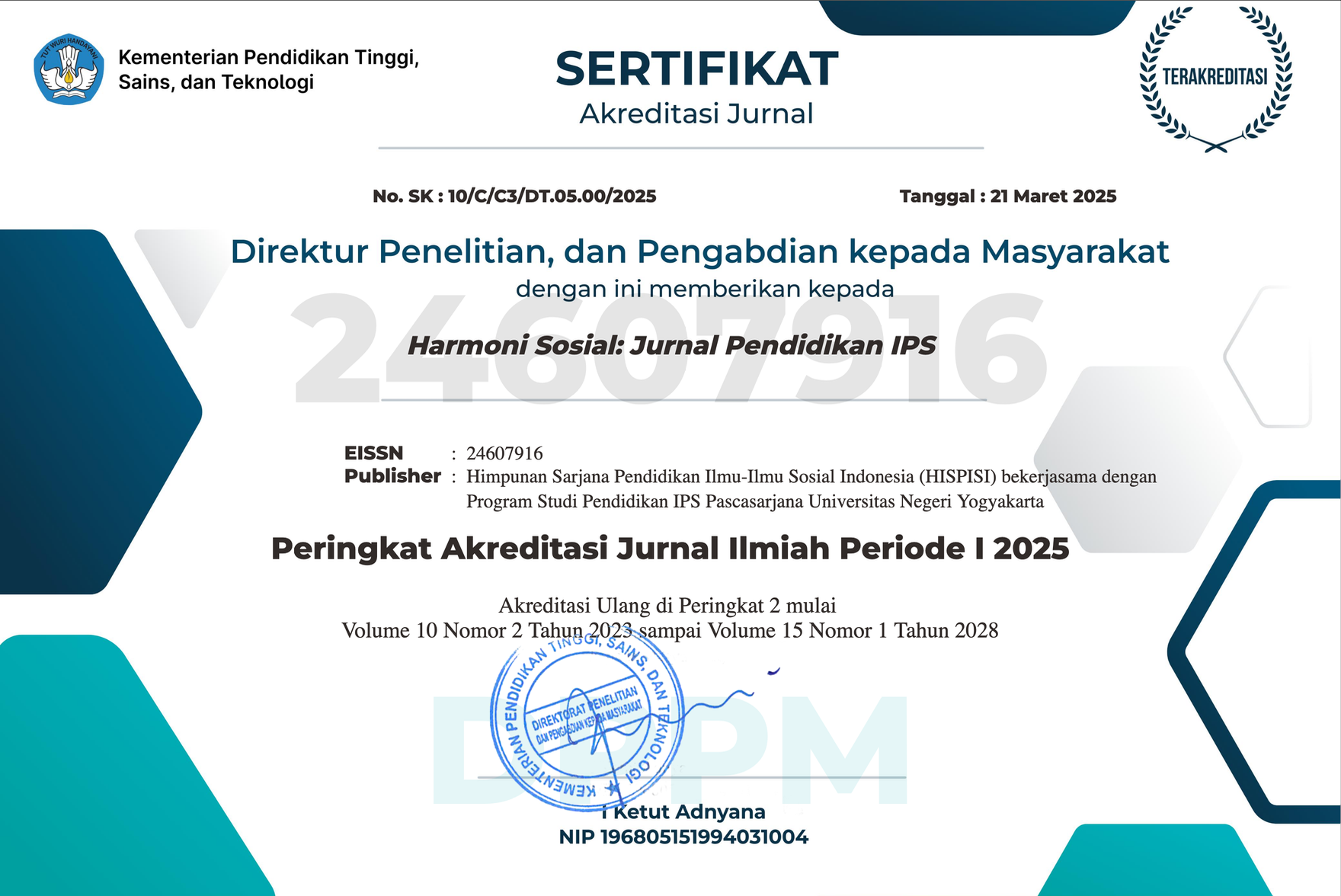Transformation of local knowledge of Lubuk Larangan toward fishing tourism
Downloads
Downloads
Adharani, Y., Zamil, Y. S., Astriani, N., & Afifah, S. S. (2020). Penerapan konsep ekowisata di Kecamatan Cihurip Kabupaten Garut dalam rangka perlindungan dan pengelolaan lingkungan. Prosiding Penelitian Dan Pengabdian Kepada Masyarakat, 7(1), 179–186. https://doi.org/10.24198/jppm.v7i1.25235
Bahagia, B., Mangunjaya, F. M., Wibowo, R., Rangkuti, Z., & Alwahid, M. A. (2020). Leuit and prohibition forest: Indigenous knowledge of an Urug community resilience. Harmoni Sosial: Jurnal Pendidikan IPS, 7(2), 130–140. https://doi.org/10.21831/hsjpi.v7i2.33055
Bahagia, B., Wibowo, R., & Mangunjaya, F. M. (2020). Indigenous Cipatat Kolot Society Resilience based on Leuit in Bogor, West Java. Etnosia : Jurnal Etnografi Indonesia, 5(2), 349–365. https://doi.org/10.31947/etnosia.v5i2.11377
Bahagia, B., Wibowo, R., Mangunjaya, F. M., & Priatna, O. S. (2020). Traditional knowledge of Urug Community for climate, conservation, and agriculture. Mimbar : Jurnal Sosial Dan Pembangunan, 36(1), 240–249.
Baharuddin, B. (2015). Bentuk-bentuk perubahan sosial dan kebudayaan. Jurnal Al-Hikmah : Jurnal Dakwah, 9(2), 180–205. https://doi.org/10.24260/al-hikmah.v9i2.323
Creswell, J. W. (2012). Educational research: Planning, conducting, and evaluating quantitative and qualitative research (4th ed.). Pearson Education. http://repository.unmas.ac.id/medias/journal/EBK-00121.pdf
Gumilang, G. S. (2016). Metode penelitian kualitatif dalam bidang bimbingan dan konseling. Jurnal Fokus Konseling ( Online ), 2(2), 144–159. https://doi.org/10.26638/jfk.218.2099
Hanafi, I. (2018). Agama dalam bayang-bayang fanatisme; Sebuah upaya mengelola konflik Agama. Toleransi : Media Ilmiah Komunikasi Umat Beragama, 10(1), 48–67. https://doi.org/10.24014/trs.v10i1.5720
Irfani, F., Bahagia, B., Mangunjaya, F. M., & Wibowo, R. (2020). Character building caring for the environment based on local knowledge in Urug societies Bogor West Java. Tunas Geografi, 9(2), 143–154. https://doi.org/10.24114/tgeo.v9i2.21194
Irrubai, M. L., Affandi, I., & Supriatna, N. (2017). Kearifan lokal awik-awik Desa Sesaot dalam perspektif Hukum Islam. Istinbath: Jurnal Hukum Dan Ekonomi Islam, 16(2), 390–418. https://doi.org/10.20414/ijhi.v16i2.8
Jufrida, J., Basuki, F. R., & Destinanda, A. (2020). Analisis dan integrasi kearifan local Lubuk Larangan Tantang Sakti dalam pembelajaran sains. Edufisika: Jurnal Pendidikan Fisika, 5(1), 32–38. https://doi.org/10.22437/edufisika.v5i01.9583
Kaffah, S., & Yasir, Y. (2021). Komunikasi lingkungan dalam menjaga kearifan lokal mencokou ikan Lubuk Larangan di Desa Tanjung Belit Kecamatan Kampar Kiri Hulu Kabupaten Kampar. Jurnal Online Mahasiswa Fakultas Ilmu Sosial Dan Ilmu Politik, 8(1), 1014. https://jom.unri.ac.id/index.php/JOMFSIP/article/view/30146
Kistanto, N. H. (2018). Transformasi sosial-budaya masyarakat Indonesia. Sabda : Jurnal Kajian Kebudayaan, 13(2), 169–178. https://doi.org/10.14710/sabda.13.2.169-178
Manahampi, R. M., Rengkung, L. R., Rori, Y. P. I., & Timban, J. F. J. (2015). Peranan ekowisata bagi kesejahteraan masyarakat bahoi kecamatan Likupang Barat. Agri-Sosioekonomi, 11(3A), 1–18. https://doi.org/10.35791/agrsosek.11.3A.2015.10181
Mangunjaya, F. M., Bahagia, B., Wibowo, R., & Yono, Y. (2020). Nujuh bulanan tradition value for societies resilience in costumary community Urug Bogor West Java. SOSIAL BUDAYA, 17(2), 106–117. https://doi.org/10.24014/sb.v17i2.10960
Mansor, N., Rashid, K. M., Mohamad, Z., & Abdullah, Z. (2015). Agro tourism potential in Malaysia. International Academic Research Journal of Business and Technology, 1(2), 37–44. http://www.iarjournal.com/wp-content/uploads/IBTC2015-p37-44.pdf
Maryanto, M., & Azizah, L. N. (2019). Perubahan sosial budaya masyarakat Desa Ngebalrejo akibat kemajuan ilmu pengetahuan dan teknologi. Indonesian Journal of Social Science Education (IJSSE), 1(2), 181–190. https://doi.org/10.29300/ijsse.v1i2.2247
Nababan, E. B. B. (2017). Analisis penelitian kualitatif dengan lima pendekatan (biografi, fenomenelogi, teori grounded, studi kasus, dan etnografi). Jurnal Ilmiah Maksitek, 2(2), 1–7. http://repository2.uph.edu/599/1/Jurnal.pdf
Nazarullail, F., Hardika, H., & Desyanty, E. S. (2017). Pemberdayaan masyarakat melalui program ekowisata "Lepen Adventure." Jurnal Pendidikan : Teori, Penelitian, Dan Pengembangan, 2(8), 1071–1076. https://doi.org/10.17977/jptpp.v2i8.9821
Sugiyono, S. (2016). Metode penelitian kuantitatif, kualitatif, dan R&D. Alfabeta.
Sumada, I. M. (2017). Peranan kearifan lokal Bali dalam perspektif kebijakan publik. JIPSi : Jurnal Ilmu Politik Dan Komunikasi, 7(1), 117–126. https://doi.org/10.34010/jipsi.v7i1.337
Ummiroh, I. R., & Hardiyani, R. (2013). Agro-ecotourism management through cooperative based coffee plantation commodity to increase welfare of coffee farmer. Journal of Economics, Business and Management, 1(4), 347–349. https://doi.org/10.7763/JOEBM.2013.V1.75
Widya, C., Andianti, R., & Pragesari, N. N. (2019). Statistik lingkungan hidup Indonesia 2019 (A. Apriyanto & D. Aryanti (eds.)). Badan Pusat Statistik Indonesia. https://www.bps.go.id/publication/2019/12/13/e11bfc8ff8392e5e13a8cff3/statistik-lingkungan-hidup-indonesia-2019.html
Wiharjokusumo, P. (2020). Kebijakan perencanaan dan pembangunan desa ekowisata dan pariwisata di Indonesia. Jurnal Ilmiah Akomodasi Agung, 7(2), 30–39. https://doi.org/10.51827/jiaa.v7i2.50
Windiani, W., & Rahmawati, F. N. (2016). Menggunakan metode etnografi dalam penelitian sosial. Dimensi : Jurnal Ilmu Sosial Dan Ilmu Budaya, 9(2), 87–92. https://journal.trunojoyo.ac.id/dimensi/article/view/3747
Yunus, M. (2020). Pengelolaan Lubuk Larangan di Sungai Kampar. ETNOREFLIKA: Jurnal Sosial Dan Budaya, 9(2), 119–129. https://doi.org/10.33772/etnoreflika.v9i2.829
The Authors submitting a manuscript do so on the understanding that if accepted for publication, copyright publishing of the article shall be assigned to Harmoni Sosial: Jurnal Pendidikan IPS
 | Harmoni Sosial: Jurnal Pendidikan IPS by http://journal.uny.ac.id/index.php/hsjpi is licensed under a Creative Commons Attribution-ShareAlike 4.0 International License. |









 ISSN Print
ISSN Print









